#International Human Solidarity Day “a day to celebrate our unity in diversity”
Text
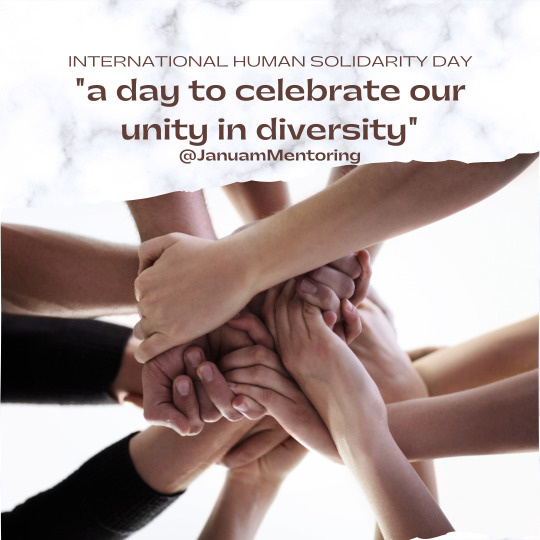
#International Human Solidarity Day “a day to celebrate our unity in diversity”#Together#Zusammen#Birlikte#साथ में#Juntos#سويا#Все вместе#Insieme#Разом#Μαζί#Ensemble#Bihevra#함께#יַחַד#一起#diversity#januam#mentoring#solidarity#HumanSolidarityDay#international#goals#social#health
1 note
·
View note
Text
The Unifying Power of Islam: Binding Diverse People Together

In a world fragmented by differences, Islam stands out as a unifying force that transcends cultural, racial, and geographical boundaries. Its ability to bring together individuals from diverse backgrounds into an international community is a testament to its enduring beauty and relevance in today’s society.
One of the most fascinating ways in which Muslims feel a connection between fellow muslims worldwide is by the means of a common and endearing greeting: “Assalamu Alaykum” (peace be upon you, commonly shortened to “Salam” or peace)
Islam emphasises the fundamental unity of humanity, teaching that all people are descendants of Adam and Eve, and thus, all races and communities are equal in the eyes of the Divine. The Quran states:
“O mankind, indeed We have created you from male and female and made you peoples and tribes that you may know one another. Indeed, the most noble of you in the sight of Allah is the most righteous of you. Indeed, Allah is Knowing and Acquainted” (Quran 49:13).
This verse underscores the importance of recognising our shared humanity and fostering mutual understanding among diverse communities.
The Brotherhood of Believers
Central to Islam is the concept of brotherhood/sisterhood among believers.
The Prophet Muhammad (peace be upon him) said, “The believers in their mutual kindness, compassion, and sympathy are just like one body. When one of the limbs suffers, the whole body responds to it with wakefulness and fever” (Sahih Bukhari).
This Hadith highlights the interconnectedness of believers and emphasizes the importance of empathy and support within the Muslim community.
Unity in Worship
Five times a day, Muslims around the world turn towards the Kaaba in Mecca, united in prayer, united in direction and united in purpose of worship. This act of collective worship, known as Salah, serves as a powerful symbol of unity and solidarity among Muslims regardless of their geographical location or cultural background. It reinforces the notion that despite our differences, we are bound together by a common faith and devotion to God.
“We have been seeing you turning your face to the heavens. So, We will certainly assign to you a Qiblah that you would like. Now, turn your face in the direction of the Sacred Mosque (Al-Masjid-ul-Harām), and (O Muslims), wherever you are, turn your faces in its direction. Even those who have been given the Book know well that it is the truth from their Lord, and Allah is not unaware of what they do.” [Quran 2:144]
Social Justice and Equality
Islam places a strong emphasis on social justice and equality, advocating for the fair treatment of all individuals irrespective of their race, ethnicity, or socioeconomic status. The Prophet Muhammad (peace be upon him) said, “None of you truly believes until he loves for his brother what he loves for himself” (Sahih Bukhari). This Hadith underscores the importance of empathy and fairness in our interactions with others, fostering a sense of unity and inclusivity within society.
Cultural Diversity within Islam
Islam is not monolithic, but rather encompasses a rich mosaic of cultures, languages, and traditions from around the world. This diversity is celebrated within the Islamic framework, with different communities bringing their unique customs and practices to the fold of Islam while maintaining their identity as Muslims. The Quran affirms this diversity, stating:
“And among His signs is the creation of the heavens and the earth, and the diversity of your languages and colours. Indeed, in that are signs for those of knowledge” (Quran 30:22)
In a world marked by division and discord, Islam offers a path towards unity, compassion, and understanding. Its teachings inspire individuals to transcend their differences and come together in pursuit of a common purpose: to worship Allah and serve humanity.

#muslim#islamic#allah#quran#islamiyet#islamdaily#islamicreminders#islam#mosque#new article#new blog#newblog
20 notes
·
View notes
Text
Other Events During Solarpunk Aesthetic Week (Winter Solstice Edition)
As you can imagine, there's a good deal of events happening during Solarpunk Aesthetic Week this season! We wanted to highlight just a few other things that are happening, so they can maybe inspire some of what you do for Solarpunk Aesthetic Week!
Arabic Language Day is on December 18th, and aims to promote and recognize the importance of the Arabic language, encouraging linguistic and cultural diversity and foster understanding. There's often conferences, workshops, and cultural performances held on this day.
It's important we consider the important role and contributions of Arabic people on history and the world, as well as the present and future of Solarpunk! It may also be a good day to jumpstart a new language learning adventure, if you want!
International Migrants Day is also on December 18th! It's a day that seeks to promote the well-being and rights of migrants worldwide, dedicated to recognizing the contributions and achievements of migrants and raising awareness about the need to improve conditions, safety measures, and social acceptance for migrant individuals and families.
Many of us like to imagine solarpunk societies as being entirely or semi-nomadic, traveling to different places depending on the seasons. But an important part of living solarpunk is supporting people right now. How can we support migrants in our communities and improve relations between Indigenous communities and immigrants in a solarpunk future? How would a solarpunk future welcome migrants while protecting and supporting indigenous communities and land? How does the reality of climate refugees in particular impact the development and ideals of a solarpunk future? How would a solarpunk society migrate across the land, and what would it look like?
International Human Solidarity Day is on December 20th, and serves as a reminder to the importance of unity in diversity and the need to work together to address global challenges. There may be various events and activities to mark this event.
Solidarity is an important tenant of Solarpunk, and of activism in general. Consider ways you can show solidarity through art, writing, music, or more. A story about people working together towards a common goal, of supporting one another in the face of a difficult obstacle? An illustration to support a current cause, or of a distant future's fight? Can you do a craft to show solidarity with others?
Winter Solstice is on December 21st in the Northern Hemisphere! It's the astronomical start of the winter season, and symbolizes the death and subsequent rebirth of the sun--the shortest day and longest night of the year.
Often when visualizing Solarpunk, we think of lots of plants and greenery on a bright sunny day. But this isn't what Solarpunk would look like everywhere, or all the time in most places. Let's visualize what we think Solarpunk would look like in fall and winter! How do you solarpunk in the colder months, what kind of crafts do you pick up when things get chilly? What do you imagine a solarpunk society's infrastructure and fashion would look like when the temperatures dip low? What would change and how when our current society is reborn into a more solarpunk one?
Summer Solstice is also December 21st in the Southern Hemisphere, marking the official beginning of the summer season! This is the zenith of the sun's position in the sky, and the longest day of the year.
While things are getting cold for some of us, the temps are just ramping up for others! Let the sun and its energy inspire your works, imbue yourself with the bright and blazing energy of our brightest star!
December 24th is Christmas Eve for those who celebrate! Many people celebrate by gathering with friends and family to enjoy feasts, exchange gifts, and generally enjoy time together.
In a consumerist society, there's a lot of emphasis placed on the gift-giving part of Christmas celebrations--how would it look in a Solarpunk society focused on community building instead? Are you doing anything Solarpunky this Christmas? Let us know!
Is there more we're forgetting? Want to share the way you celebrate a particular event? Sound off and let us know--we'd love to hear about other related events and how you're taking part!
15 notes
·
View notes
Text
International Day Against Homophobia, Transphobia, Biphobia
No One Left Behind: The Fight for LGBTQ+ Equality Continues
May 17th is a big day for the LGBTQIA+ community and allies worldwide. It's the International Day Against Homophobia, Transphobia, and Biphobia (IDAHOBIT), and this year's theme is "No one left behind: equality, freedom and justice for all."
The Harsh Reality
Let's keep it real - being part of the LGBTQ+ community ain't always a walk in the park. For too long, our queer fam has faced discrimination, hate, and straight-up injustice just for being themselves. From getting denied basic human rights to dealing with legal inequalities, it's been a constant struggle. But you know what? We're not backing down. The LGBTQIA+ community is resilient AF, and we're not gonna stop until we get the equality, freedom, and justice we deserve.
Celebrating Love and Diversity
At the end of the day, IDAHOBIT is all about celebrating love in all its beautiful forms. It's about embracing the diversity that makes our world so vibrant and colorful. Love doesn't have a gender, sexual orientation, or identity – it's a universal language that transcends boundaries. By fostering an environment of inclusivity and understanding, we can create a world where everyone can live their truth without fear or judgment. That's the dream, fam.
Unity is Key
But here's the thing – we can't do this alone. The fight for LGBTQ+ equality is a collective effort, and we need allies from all walks of life to join us. It's time to break the silence, confront the biases, and stand in solidarity with our community. This IDAHOBIT, let's raise our voices together and demand a future where no one is left behind. Where love triumphs over hate, and equality reigns supreme. We've come a long way, but the journey ain't over yet. Let's keep pushing, keep fighting, and keep spreading love and acceptance. Because at the end of the day, that's what really matters.
Stay fierce, stay proud, and never forget – we're in this together.
Read the full article
0 notes
Text

It's December 20th, 🫶 International Human Solidarity Day. On this day in 2002, the United Nations established the World Solidarity Fund for the eradication of poverty and the promotion of human and social development in developing countries – especially among their poorest people. To strengthen the world's resolve to eradicate poverty, the UN decided to commemorate the creation of the World Solidarity Fund by celebrating International Human Solidarity Day on this day every year.
Solidarity is identified in the UN's Millennium Declaration as one of the fundamental values of international relations in the 21st Century – that those who suffer the most or benefit the least in this world deserve help from those who benefit the most. In the context of increasing globalization and its resultant growing inequality, it's becoming more and more important to strengthen international solidarity to promote a culture of sharing and giving.
On this day, let's all celebrate our diverse racial, ethnic, linguistic, cultural, political, and religious backgrounds and dedicate ourselves to work in unity with each other as we struggle to solve the great problems facing us today, tomorrow, and beyond. ☮️ Peace… Jamiese of Pixoplanet
#Jamiese#Pixoplanet#international human solidarity day#solidarity#solidarity day#SDG5#Unity#International Day Of Human Solidarity#community#Charity#maternal health#human rights#aminata maternal foundation#Diversity#non for profit#giving#UNESCO#UN#IHSD#Unity In Diversity#indigenous solidarity#unity#solidarity pledge#world human solidarity day#Stronger Together#Education#Solidarity Forever#Solidarity Knows No Borders#SDGs#Poverty
0 notes
Text
Align With International Human Solidarity Day In Eradicating Poverty Through Education
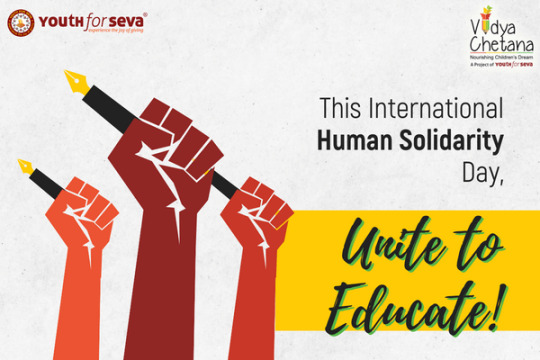
Cooperation, mutual understanding and unity becomes the premise for peace and development across the local, national, and international arena. With this as the base, the United Nations General Assembly announced 20th December to be observed annually as the International Human Solidarity Day, a step to combat poverty through solidarity and collective involvement. As stated by the United Nations (https://www.un.org/en/observances/human-solidarity-day), International Human Solidarity Day is a day to:
Celebrate our unity in diversity.
Remind governments to respect their commitments to international agreements
Raise public awareness of the importance of solidarity.
Encourage debate on the ways to promote solidarity for the achievement of the Sustainable Development Goals including poverty eradication.
Take action to encourage new initiatives for poverty eradication.
Solidarity and its impact
Solidarity, compassion, and responsible actions can result in sustainable and impactful changes. From something as simple as helping a visually impaired person cross the road to providing school supplies to the underprivileged children in your neighbourhood to choosing to donate to NGO, and similar other actions can bring about a change in the grassroot level and upwards.
Bringing the focus to education, which is one of the most potential mediums to uplift communities, let’s take a look at the impact that can be created by uniting to make education accessible to all. When you help to educate an underprivileged child either on your own or by supporting an NGO helping poor students, you make a 360-degree impact on the child’s personal development, their family, and the country as a whole.
· Education has a direct impact on the beneficiaries by contributing towards their basic literacy skills, specialised subjects, knowledge, cognitive development, skill and talent development, personality development, confidence, and goal attainment.
· Educated individuals provide for and uplift their families that results in discontinuity of intergenerational poverty, better income and progress in socio-economic status, better education opportunities for children, better lifestyle choices, improved health, and practice of gender equality among parents and children.
· Educated citizens lead the country from the front as a skilled workforce and carve a place for the nation in the global platform facilitating steady economic growth, gender and socio-economic equality, better livelihood, and technological advancement.
Unite to educate
It is evident that opting to donate to NGO is one of the many ways to get involved in uplifting the society. And when it is about supporting the cause of education, Vidya Chetana should definitely be on your list.
Vidya Chetana is an Indian NGO helping poor students since 2009. This NGO provides financial aid in the form of scholarships for higher education to students who are from socio-economically less-privileged backgrounds, but are academically brilliant and promising. As an NGO helping poor students, Vidya Chetana has by far supported the education of 5,775 students across 12 states in India. The scholarships provided by Vidya Chetana helped these beneficiaries to pursue and complete their PUC (10+2), Degree, Engineering, and Medical studies. Apart from providing scholarships, Vidya Chetana also provides career counselling, and conducts life skill sessions, 21st-century skills sessions, and Employability Readiness Programme for all its beneficiaries. So, when you donate to Vidya Chetana, you not only provide the much-needed higher education, but also facilitate their overall development of potential students.
Sahana, an alumnus from this NGO helping poor students is an example of the impact of making higher education accessible. Today, she is an independent professional working in the IT industry. She was a passionate and ambitious student, but financial conditions of her family hindered her academic progress. The timely intervention by Vidya Chetana enabled her to complete BTech and she began her career by securing a job with IBM in Bangalore.
Empower the youth through education
Education is a potential medium to bridge the socio-economic gap. So, when you donate to NGO supporting education, you initiate a revolution to enable the next generation to become resourceful and responsible. This International Human Solidarity Day, unite to educate for an empowered tomorrow!
Author Profile:
Vidya Chetana Scholarship Program is an initiative of Youth for Seva to support the higher education of socio-economically underprivileged students. Your support will help students wanting to pursue PUC (Intermediate), Degree, Engineering, and Medical Courses. Your contribution towards the Scholarship Program will help students continue their education as well as qualify you to receive tax exemption on your donated amount (₹500 & above).
#human solidarity day#ngo helping poor students#donate to ngo#ngo working for education#education ngo#ngo blogs#ngo articles#ngo help
0 notes
Text
Remind governments to respect their commitments to international agreements.

International Human Solidarity Day is:
a day to celebrate our unity in diversity;
a day to remind governments to respect their commitments to international agreements;
a day to raise public awareness of the importance of solidarity;
a day to encourage debate on the ways to promote solidarity for the achievement of the Sustainable Development Goals including poverty eradication;
a day of action to encourage new initiatives for poverty eradication.
#International Human Solidarity Day#poverty alleviation#20 december#2030 agenda#solidarityday#United Nations Department of Economic and Social Affairs#UNDESA#international agreements
0 notes
Photo

Today is International Human Solidarity Day, celebrated to highlight one of the fundamental founding reasons for the creation of the United Nations. This is a day to celebrate our unity and diversity while promoting the importance of solidarity. 🕊 Religions for Peace is committed to promoting peace and inter-religious unity among all. #InternationalHumanSolidarityDay #humanrights #peace #unity #solidarity #qualitynursingservice #qualitynursingbureau #qualitynursingcare https://www.instagram.com/p/CXtgSGuv1Tc/?utm_medium=tumblr
#internationalhumansolidarityday#humanrights#peace#unity#solidarity#qualitynursingservice#qualitynursingbureau#qualitynursingcare
0 notes
Photo
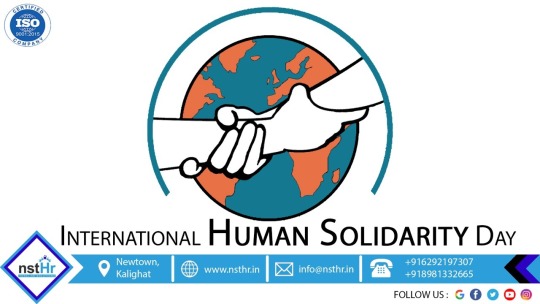
👉We Must Stand Together United in Solidarity Against the Targeting, Demonization, and Vilification of Any Group of People.
🔹International Human Solidarity Day provides us with a bright opportunity to celebrate our unity in diversity.
🔹On this Day importance and needs of solidarity must be debated and discussed at proper forums.
🔹Solidarity is one of the basic tools for the eradication of poverty from society.
🔹This Day is also a reminder for governments to respect international agreements.
💁Happy International Human Solidarity Day.
#teamnstHr #nstHr #jobvacancy #recruiting #recruitment #hiring #jobs #jobsearch #employment #JobOpening #serviceconsultant #newjob #careers #placements #Jobsearching #humanresources #staffing #staffingsolutions #HumanSolidarityDay #solidarity #humanrights #InternationalHumanSolidarityDay
0 notes
Photo
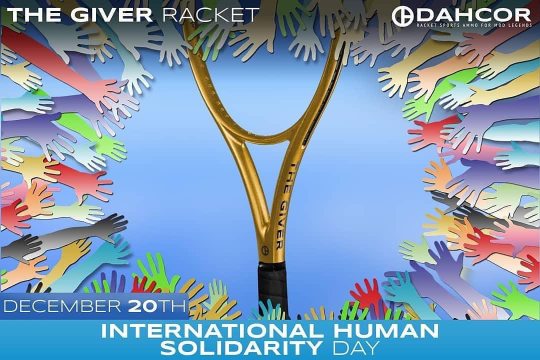
The new Sustainable Development Goals (SDGs) agenda is centred on people & planet, underpinned by human rights and supported by a global partnership determined to lift people out of poverty, hunger and disease. It will be thus be built on a foundation of global cooperation and solidarity. International Human Solidarity Day is: a day to celebrate our unity in diversity; a day to remind governments to respect their commitments to international agreements; a day to raise public awareness of the importance of solidarity; a day to encourage debate on the ways to promote solidarity for the achievement of the Sustainable Development Goals including poverty eradication; a day of action to encourage new initiatives for poverty eradication. #racketoftheday #tennisracket #CustomMade #breakthetie (em UN Sustainable Development Platform) https://www.instagram.com/p/CXsjHm2gPE_/?utm_medium=tumblr
0 notes
Text
International Human Solidarity Day Celebrated at AAFT

Noida: The General Assembly, on 22 December 2005, identified solidarity as one of the fundamental and universal values that should underlie relations between peoples in the twenty-first century, and in that regard decided to proclaim 20 December of each year International Human Solidarity Day.
The concept of solidarity has defined the work of the United Nations since the birth of the Organization. The creation of the United Nations drew the peoples and nations of the world together to promote peace, human rights and social and economic development.
“International Human Solidarity Day is: a day to celebrate our unity in diversity; a day to remind governments to respect their commitments to international agreements; a day to raise public awareness of the importance of solidarity; a day to encourage debate on the ways to promote solidarity for the achievement of the Sustainable Development Goals including poverty eradication and it is a day of action to encourage new initiatives for poverty eradication,” said Dr. Sandeep Marwah Chancellor of AAFT University of Media And Arts while talking to the media students of the University.
“It is in the spirit of solidarity that the Organization relies on “cooperation in solving international problems of an economic, social, cultural or humanitarian character” as well,” added Dr. Marwah who is also Chair for World Peace Development And Research Foundation. The event was supported by ICMEI- International Chamber of Media And Entertainment Industry and IJC-International Journalism Centre.
0 notes
Text
20th December: International Human Solidarity Day
The Sustainable Development Agenda is centred on people & planet, underpinned by human rights and supported by a global partnership determined to lift people out of poverty, hunger and disease. It will, thus, be built on a foundation of global cooperation and solidarity.
International Human Solidarity Day is:
a day to celebrate our unity in diversity;
a day to remind governments to respect their commitments to international agreements;
a day to raise public awareness of the importance of solidarity;
a day to encourage debate on the ways to promote solidarity for the achievement of the Sustainable Development Goals including poverty eradication;
a day of action to encourage new initiatives for poverty eradication
The UN and the Concept of Solidarity
The concept of solidarity has defined the work of the United Nations since the birth of the Organization. The creation of the United Nations drew the peoples and nations of the world together to promote peace, human rights and social and economic development. The Organization was founded on the basic premise of unity and harmony among its members, expressed in the concept of collective security that relies on the solidarity of its members to unite “to maintain international peace and security.”
0 notes
Photo
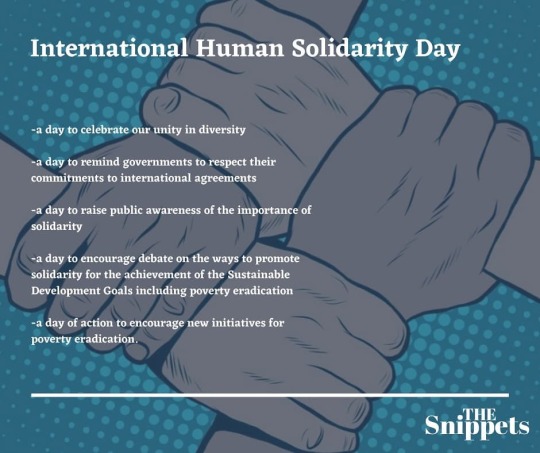
International Human Solidarity Day a day to celebrate our unity in diversity; a day to remind governments to respect their commitments to international agreements; a day to raise public awareness of the importance of solidarity; a day to encourage debate on the ways to promote solidarity for the achievement of the Sustainable Development Goals including poverty eradication; a day of action to encourage new initiatives for poverty eradication. . Credit @google . . #news #newsupdate #international #human #solidarity #day #diversity #unity #government #unitednations #united #snippets (at India) https://www.instagram.com/p/CJBcuROlKav/?igshid=epbfhe5n1732
#news#newsupdate#international#human#solidarity#day#diversity#unity#government#unitednations#united#snippets
0 notes
Text
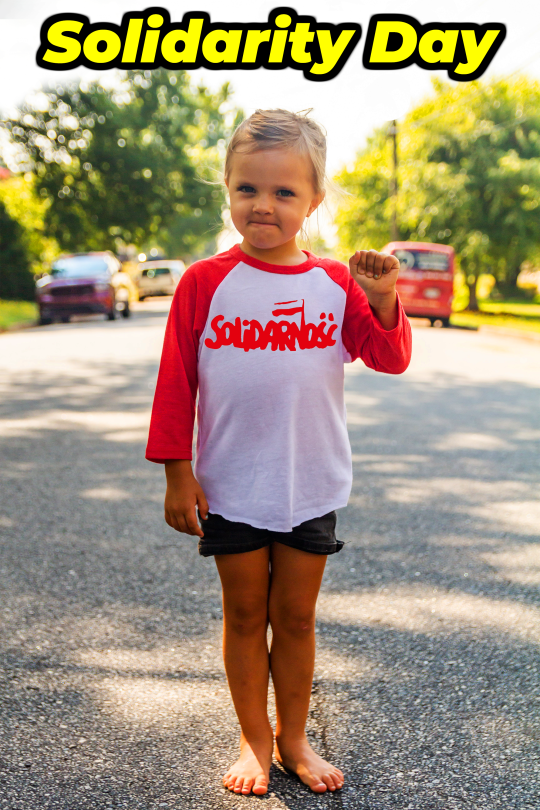

It's December 20th, International Human Solidarity Day. On this day in 2002, the United Nations established the World Solidarity Fund for the eradication of poverty and promotion of human and social development in developing countries – especially among their poorest people. To strengthen the world's resolve to eradicate poverty, the UN decided to commemorate the creation of the World Solidarity Fund by celebrating International Human Solidarity Day on this day every year.
Solidarity is identified in the UN's Millennium Declaration as one of the fundamental values of international relations in the 21st Century – that those who suffer the most or benefit the least in this world deserve help from those who benefit the most. In the context of increasing globalisation and its resultant growing inequality, it's becoming more and more important to strengthen international solidarity to promote a culture of sharing and giving.
On this day, let's all celebrate our diverse racial, ethnic, linguistic, cultural, political, and religious backgrounds and dedicate ourselves to work in unity with each other as we struggle to solve the great problems facing us today, tomorrow, and beyond. ☮️ Peace… Jamiese of Pixoplanet
#Jamiese#Pixoplanet#InternationalHumanSolidarityDay#SolidarityDay#Solidarity#SolidarityForever#SolidarityKnowsNoBorders#SDGs#Poverty#Climate#Education#GiveBack#Charity#Aid#SDG5#UNTF#Give25forUNTF25#Girls#Empowerment#UN#UnitedNations#UNESCO#COVIDiots#InternationalDayOfHumanSolidarity#IHSD#IHSDMyk2021#UnityInDiversity#Diversity#Unity#Chess4Solidarity
2 notes
·
View notes
Photo
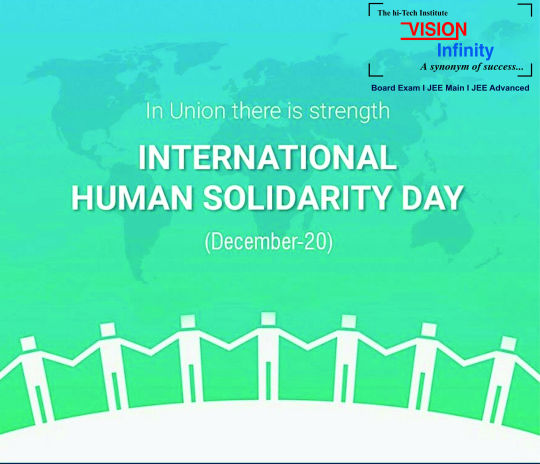
International Human Solidarity Day *a day to celebrate our unity in diversity;*a day to remind governments to respect their commitments to international agreements;*a day of action to encourage new initiatives for poverty eradication#InternationalHumanSolidarityDay #solidarity #VisionInfinity #IITJEE
0 notes
Text
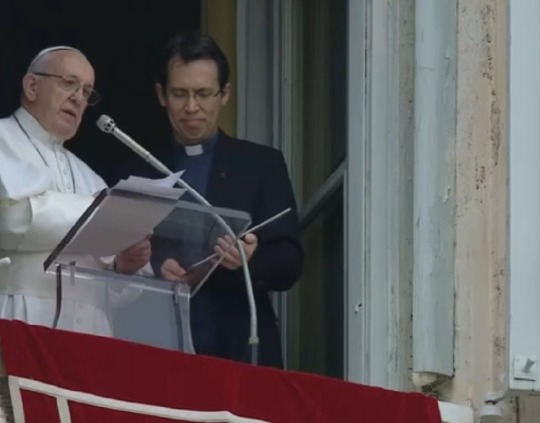
24th January >> (@ZenitEnglish) #PopeFrancis #Pope Francis Pope’s Message for 53rd World Day of Communications (Full Text)
‘We are members one of another’
The Vatican on January 24, 2019, released the Holy Father’s message for the 53rd World Day of Communications to be held in 2019. The theme: “We are members one of another” (Eph 4,25). From social network communities to the human community.
******
Dear Brothers and Sisters,
Ever since the internet first became available, the Church has always sought to promote its use in the service of the encounter between persons, and of solidarity among all. With this Message, I would like to invite you once again to reflect on the foundation and importance of our being-in-relation and to rediscover, in the vast array of challenges of the current communications context, the desire of the human person who does not want to be left isolated and alone.
The metaphors of the net and community
Today’s media environment is so pervasive as to be indistinguishable from the sphere of everyday life. The Net is a resource of our time. It is a source of knowledge and relationships that were once unthinkable. However, in terms of the profound transformations technology has brought to bear on the process of production, distribution, and use of content, many experts also highlight the risks that threaten the search for and sharing of, authentic information on a global scale. If the Internet represents an extraordinary possibility of access to knowledge, it is also true that it has proven to be one of the areas most exposed to disinformation and to the conscious and targeted distortion of facts and interpersonal relationships, which are often used to discredit.
We need to recognize how social networks, on the one hand, help us to better connect, rediscover, and assist one another, but on the other, lend themselves to the manipulation of personal data, aimed at obtaining political or economic advantages, without due respect for the person and his or her rights. Statistics show that among young people one in four is involved in episodes of cyberbullying.[1]
In this complex scenario, it may be useful to reflect again on the metaphor of the net, which was the basis of the Internet to begin with, to rediscover its positive potential. The image of the net invites us to reflect on the multiplicity of lines and intersections that ensure its stability in the absence of a center, a hierarchical structure, a form of vertical organization. The networks because all its elements share responsibility.
From an anthropological point of view, the metaphor of the net recalls another meaningful image: the community. A community is that much stronger if it is cohesive and supportive, if it is animated by feelings of trust, and pursues common objectives. The community as a network of solidarity requires mutual listening and dialogue, based on the responsible use of language.
Everyone can see how, in the present scenario, social network communities are not automatically synonymous with community. In the best cases, these virtual communities are able to demonstrate cohesion and solidarity, but often they remain simply groups of individuals who recognize one another through common interests or concerns characterized by weak bonds. Moreover, in the social web identity is too often based on opposition to the other, the person outside the group: we define ourselves starting with what divides us rather than with what unites us, giving rise to suspicion and to the venting of every kind of prejudice (ethnic, sexual, religious and other). This tendency encourages groups that exclude diversity, that even in the digital environment nourish unbridled individualism which sometimes ends up fomenting spirals of hatred. In this way, what ought to be a window on the world becomes a showcase for exhibiting personal narcissism.
The Net is an opportunity to promote encounter with others, but it can also increase our self-isolation, like a web that can entrap us. Young people are the ones most exposed to the illusion that the social web can completely satisfy them on a relational level. There is the dangerous phenomenon of young people becoming “social hermits” who risk alienating themselves completely from society. This dramatic situation reveals a serious rupture in the relational fabric of society, one we cannot ignore.
This multiform and dangerous reality raises various questions of an ethical, social, juridical, political and economic nature, and challenges the Church as well. While governments seek legal ways to regulate the web and to protect the original vision of a free, open and secure network, we all have the possibility and the responsibility to promote its positive use.
Clearly, it is not enough to multiply connections in order to increase mutual understanding. How, then, can we find our true communitarian identity, aware of the responsibility we have towards one another in the online network as well?
We are members one of another
A possible answer can be drawn from a third metaphor: that of the body and the members, which Saint Paul uses to describe the reciprocal relationship among people, based on the organism that unites them. “Therefore, putting away falsehood, speak the truth, each to his neighbor, for we are members one of another” (Eph 4:25). Being members one of another is the profound motivation with which the Apostle invites us to put away falsehood and speak the truth: the duty to guard the truth springs from the need not to belie the mutual relationship of communion. Truth is revealed in communion. Lies, on the other hand, are a selfish refusal to recognize that we are members of one body; they are a refusal to give ourselves to others, thus losing the only way to find ourselves.
The metaphor of the body and the members leads us to reflect on our identity, which is based on communion and on “otherness”. As Christians, we all recognize ourselves as members of the one body whose head is Christ. This helps us not to see people as potential competitors, but to consider even our enemies as persons. We no longer need an adversary in order to define ourselves, because the all-encompassing gaze we learn from Christ leads us to discover otherness in a new way, as an integral part and condition of relationship and closeness.
Such a capacity for understanding and communication among human persons is based on the communion of love among the divine Persons. God is not Solitude, but Communion; he is Love, and therefore communication because love always communicates; indeed, it communicates itself in order to encounter the other. In order to communicate with us and to communicate himself to us, God adapts himself to our language, establishing a real dialogue with humanity throughout history (cf. Second Vatican Ecumenical Council, Dogmatic Constitution Dei Verbum, 2).
By virtue of our being created in the image and likeness of God who is communion and communication-of-Self, we carry forever in our hearts the longing for living in communion, for belonging to a community. “Nothing, in fact, is as specific to our nature as entering into a relationship one with another, having need of one another,” says Saint Basil.[2]
The present context calls on all of us to invest in relationships and to affirm the interpersonal nature of our humanity, including in and through the network. All the more so, we Christians are called to manifest that communion which marks our identity as believers. Faith itself, in fact, is a relationship, an encounter; and under the impetus of God’s love, we can communicate, welcome and understand the gift of the other and respond to it.
Communion in the image of the Trinity is precisely what distinguishes the person from the individual. From faith in God who is Trinity, it follows that in order to be myself I need others. I am truly human, truly personal, only if I relate to others. In fact, the word “person” signifies the human being as a “face”, whose face is turned towards the other, who is engaged with others. Our life becomes more human insofar as its nature becomes less individual and more personal; we see this authentic path of becoming more human in one who moves from being an individual who perceives the other as a rival, to a person who recognizes others as traveling companions.
From a “like” to an “amen”
The image of the body and the members reminds us that the use of the social web is complementary to an encounter in the flesh that comes alive through the body, heart, eyes, gaze, breath of the other. If the Net is used as an extension or expectation of such an encounter, then the network concept is not betrayed and remains a resource for communion. If a family uses the Net to be more connected, to then meet at table and look into each other’s eyes, then it is a resource. If a Church community coordinates its activity through the network and then celebrates the Eucharist together, then it is a resource. If the Net becomes an opportunity to share stories and experiences of beauty or suffering that are physically distant from us, in order to pray together and together seek out the good to rediscover what unites us, then it is a resource.
We can, in this way, move from diagnosis to treatment: opening the way for dialogue, for encounter, for “smiles” and expressions of tenderness… This is the network we want, a network created not to entrap, but to liberate, to protect a communion of people who are free. The Church herself is a network woven together by Eucharistic communion, where unity is based not on “likes”, but on the truth, on the “Amen”, by which each one clings to the Body of Christ, and welcomes others.
From the Vatican, 24 January 2019, the Memorial of Saint Francis de Sales.
Franciscus
[1] To stem this phenomenon, an International Observatory for Cyberbullying Prevention will be established with its headquarters in the Vatican.
[2] Detailed Rule for Monks, III, 1: PG 31, 917; cf. Benedict XVI, Message for the 43rd World Communications Day (2009).
© Libreria Editrice Vatican
24th JANUARY 2019 17:26MEDIA
0 notes